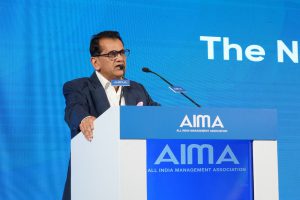
Mr Amitabh Kant, India’s G20 Sherpa, Government of India, at AIMA’s 10th National Leadership Conclave.
India can turn global disruption into opportunity by leading in green, digital and AI innovation, said Mr Amitabh Kant, India’s G20 Sherpa, Government of India, at AIMA’s 10th National Leadership Conclave.
We are living through a seismic reconfiguration of the global order. It’s not just about tariffs or trade wars—it’s about the tectonic shifts in geopolitics, economic globalisation, and technology that are reshaping our world. From my perspective, these changes present not a crisis, but a once-in-a-generation opportunity for India to assert itself on the global stage.
First, consider the geopolitical conflicts. We are witnessing a return of big power rivalries, starting with the prolonged war in Europe between Russia and Ukraine. This war signals the end of a long era of post-World War II stability. In the Middle East, instability is flaring up again, impacting oil prices- critical for a country like India that imports $180 billion worth of fossil fuels.
Meanwhile, in Asia, the threat of a China-Taiwan conflict looms large. If China takes control of Taiwan, it could dominate global semiconductor production, as laid out in Chris Miller’s Chip War. These tensions emphasise one thing: countries must avoid becoming pawns in great power games. We must uphold an independent foreign policy.
Second, economic globalisation is undergoing a breakdown. Supply chains have fractured, and there’s a growing backlash against free trade, especially in the West. Ironically, countries like the U.S. and Europe—once champions of open markets—are turning inward. The U.S. trade deficit reached $1.2 trillion in 2024, and Trump’s new tariff strategy, targeting over 60 countries with a complex system, reflects a radical shift. His 90-day pause on tariffs (excluding China) gives India a narrow window to position itself as an alternative manufacturing hub.
Third, AI is disrupting everything. The U.S. has invested heavily in AI through initiatives like the Stargate programme, while China has embraced open-source innovation with models like DeepSeek. India stands at a unique advantage here. We have the second-largest developer community, high AI adoption rates, and a rich pool of engineers. Mr Sam Altman, CEO, OpenAI once dismissed India’s AI ambitions, but has since reversed his stance, recognising our potential.
So, how do we seize this moment?
First, we must simplify our business environment—cut outdated regulations, eliminate bureaucratic red tape and aim to become the easiest place to do business, like Singapore. Second, we need to cut duties on key inputs and components to integrate seamlessly into global supply chains. Blocking imports only raises production costs, making us less competitive. Third, we should pursue smart trade deals with the U.S., Europe and others to become a true global manufacturing and export base.
We must also rationalise GST and interest rates, restructure the statutory liquidity ratio and ensure fast-track clearances for companies relocating from China or Vietnam. This is the time to roll out the red carpet for global manufacturers and become a trusted supplier in sectors like electronics, pharma, textiles and defence.
Ultimately, this isn’t just a policy pivot- it’s a mindset shift. Let’s stop seeing ourselves as regulators and start acting as developers. Let’s innovate with frugality and scale, the way ISRO has shown we can.
This is India’s moment. Let’s not let it pass us by!
Watch the full session- https://www.youtube.com/watch?v=QpHbb_0TlPU



